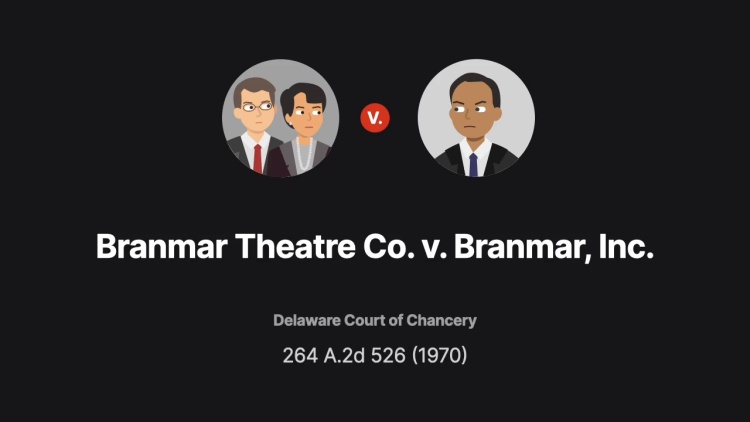Branmar Theatre Co. v. Branmar, Inc.
Delaware Court of Chancery
264 A.2d 526 (1970)
- Written by Tammy Boggs, JD
Facts
Branmar Theatre Co. (Branmar Theatre) (plaintiff) was a corporation that entered into a lease agreement with Branmar, Inc. (Branmar) (defendant). Branmar’s principal, Joseph Luria, negotiated the lease with the Rappaport family, which owned all the capital stock of Branmar Theatre. Under the lease, (1) Branmar agreed to construct a building for the operation of a movie theater, and (2) Branmar Theatre agreed to pay Branmar a fixed amount of rent plus a certain percentage of Branmar Theatre’s receipts from admissions and concessions. Luria satisfied himself that the Rappaports were successful theater operators. The 16-page lease contained a non-assignment clause prohibiting Branmar Theatre from assigning the lease to anyone without Branmar’s prior written consent. Subsequently, Muriel and Reba Schwartz, who were also theater operators, expressed a wish to manage the movie theater for the Rappaports. Branmar rejected an assignment of the lease to the Schwartzes per the non-assignment clause. Thereafter, the Rappaports sold their shares of Branmar Theatre to the Schwartzes. Branmar considered this change in control of Branmar Theatre to constitute a breach of the lease agreement and the lease to be void. Branmar Theatre sued Branmar, seeking a declaratory judgment that the lease was valid and could not be canceled under the circumstances.
Rule of Law
Issue
Holding and Reasoning (Short, J.)
What to do next…
Here's why 907,000 law students have relied on our case briefs:
- Written by law professors and practitioners, not other law students. 47,100 briefs, keyed to 996 casebooks. Top-notch customer support.
- The right amount of information, includes the facts, issues, rule of law, holding and reasoning, and any concurrences and dissents.
- Access in your classes, works on your mobile and tablet. Massive library of related video lessons and high quality multiple-choice questions.
- Easy to use, uniform format for every case brief. Written in plain English, not in legalese. Our briefs summarize and simplify; they don’t just repeat the court’s language.





